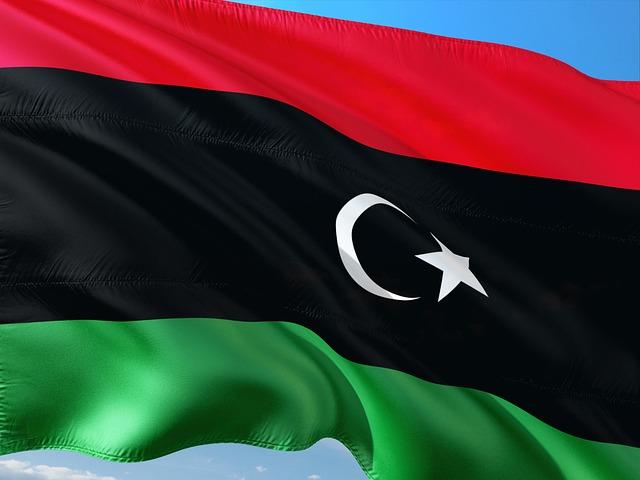In recent years, the geopolitical landscape of North Africa has become increasingly complex, with the conflict in Libya serving as a focal point for regional tensions and power struggles. At the heart of this turmoil are Egypt and Turkey, two key players whose competing interests have not only fueled the chaos in libya but also pose a notable challenge to their burgeoning diplomatic relations. As both nations seek to assert their influence in the region, their starkly opposing views on LibyaŌĆÖs long-running conflict risk jeopardizing the steps they have taken toward rapprochement. This article explores the past context of Egypt-Turkey relations, examines the intricacies of their respective positions in the libyan conflict, and analyzes whether their contrasting strategies will ultimately hinder their efforts at collaboration or pave the way for a new chapter in regional diplomacy.
Understanding the Historical Context of Egypt-Turkey Relations in the Libyan Conflict
The historical context of Egypt-Turkey relations reveals a complex tapestry woven through centuries of political, military, and ideological shifts. Initially, the relationship between the two nations was marked by cooperation during the late Ottoman Empire, as both shared common interests in trade and regional stability. However, the dissolution of the empire and the subsequent rise of nationalism in both countries shifted their dynamics. In recent years, their paths diverged sharply, especially in regard to external conflicts such as the Libyan civil war. Egypt’s support for Khalifa Haftar and the Libyan National Army stands in stark opposition to Turkey’s backing of the Government of National Accord (GNA), deepening their rivalry and complicating diplomatic efforts for reconciliation.
This ongoing conflict is symptomatic of larger geopolitical struggles, where both nations seek to assert their influence in the Eastern Mediterranean. Key factors contributing to this complexity include:
- Historical territorial claims and national pride
- Influences of foreign powers, particularly the United States and Russia
- Ideological differences rooted in political Islam versus secular nationalism
As the situation in Libya evolves, the question remains whether these conflicting interests will serve as an insurmountable barrier to the potential rapprochement between Egypt and Turkey, or if they can find a way to navigate their differences for the sake of regional stability. The delicate balance of power in Libya is not merely a local concern, but a reflection of broader international dynamics, making any resolution not just a bilateral affair, but a matter of global importance.

Analyzing the Strategic Interests of Egypt and Turkey in Libya
The strategic interests of egypt and turkey in Libya are deeply rooted in historical rivalries and contemporary geopolitical ambitions. For Egypt, the situation in Libya is primarily viewed through the lens of national security. The Egyptian government aims to prevent the spillover of instability from Libya, which it fears could empower extremist groups along its border. moreover, Egypt has supported the Libyan National Army (LNA), led by Khalifa Haftar, which aligns with its efforts to curb Islamist militancy. Conversely, turkeyŌĆÖs involvement in Libya is closely tied to its desire to expand its influence in the Eastern Mediterranean and to support the Government of National Unity (GNU), recognized by the UN.TurkeyŌĆÖs backing of the GNU not only serves its strategic objectives but also bolsters its narrative as a leading power in the region capable of countering rival nations like Egypt and the UAE.
These diverging interests manifest in various ways, complicating the prospects for rapprochement between the two nations. The military competition in Libya has led to a proxy conflict, where both Egypt and Turkey are willing to exert resources to ensure their respective allies succeed. This situation can be further complicated by foreign intervention and alliances, where other regional actors like Russia and the UAE play crucial roles, further entrenching the conflict. Additionally, diplomatic engagements between Turkey and Egypt have yet to yield significant breakthroughs, largely because both sides are hesitant to compromise on their foundational positions regarding Libya. As a result, the ongoing geopolitical tug-of-war creates a challenging landscape that threatens to undermine any potential cooperative undertakings between these two influential nations.
The Impact of Regional Alliances on Egypt-Turkey Relations
The current dynamics of regional alliances significantly influence the strained relationship between Egypt and Turkey, particularly in the context of the ongoing conflict in Libya. Both nations are attempting to consolidate their respective power in the eastern Mediterranean and North African areas, yet their strategic interests ofen clash. Key factors shaping their interaction include:
- support for Competing Factions: Egypt backs the Libyan National Army (LNA) led by Khalifa Haftar,while Turkey endorses the Government of National Accord (GNA). This divergence exacerbates tensions and complicates potential diplomatic engagements.
- geopolitical Influence: Each country seeks to extend its influence in the region, viewing Libya as a critical battleground for asserting dominance over resources and alliances, which can further drive a wedge between them.
Moreover, recent developments within regional alliances, including partnerships and treaties with other nations, further complicate Egypt-Turkey relations. For instance, the increasing alignment between Egypt and Gulf Arab states, along with Turkey’s collaborations with Qatar and various Libyan militias, poses compatibility challenges. These alliances can be exemplified in the following table:
| Country | Key Alliances | Stance on Libya |
|---|---|---|
| Egypt | Gulf Arab States,LNA | Supports Haftar |
| Turkey | Qatar,GNA | Supports GNA |
| Russia | LNA | Supports Haftar |
| united States | NATO Allies | Neutral |
As both Egypt and Turkey navigate their relationships within these shifting alliances,the potential for conflict versus cooperation in Libya remains a crucial litmus test for their bilateral dialogue. The looming question remains whether opposing interests will ultimately hinder efforts for rapprochement.

Assessing the Role of International Actors in the Libya Conflict
The complex dynamics of the Libya conflict have attracted various international actors, each with a particular interest and agenda that often conflicts with others.Turkey has been instrumental in supporting the Government of National Unity (GNU), providing military assistance and resources to bolster its position against rival factions. Conversely, Egypt has aligned itself with the Libyan National Army (LNA) led by Khalifa Haftar, citing national security concerns over the spillover of instability into its territory. This division not only exacerbates the conflict but also complicates diplomatic relations, as both nations seek to expand their influence in the North African region.
The involvement of these international players has profound implications for LibyaŌĆÖs future, where a fragile ceasefire could be jeopardized by external pressures. As both Egypt and Turkey pursue their interests, key issues remain unresolved, including the legitimacy of the rival governments, the control of oil resources, and the fate of armed militias that litter the landscape. Without a coordinated international approach that addresses the root causes of the conflict, these opposing views could lead to a sustained geopolitical stand-off.Stakeholders must therefore consider the efficacy of their strategies to avoid further entrenching divisions that would hinder peace efforts.

Potential Pathways for Diplomatic Reconciliation between Egypt and Turkey
In recent years, the geopolitical landscape of North Africa, particularly concerning Libya, has inadvertently presented opportunities for Egypt and Turkey to reconsider their historically rocky relationship.Both nations share a vested interest in a stable Libya, which could serve as a catalyst for rapprochement. Some potential pathways for diplomatic reconciliation could include:
- Engaging in Multilateral Dialogues: Facilitating discussions that include other regional players may help in mitigating tension and fostering a cooperative approach to the Libyan issue.
- Economic Collaborations: Exploring opportunities for economic partnerships in sectors like energy and infrastructure could pave the way for improved relations and mutual benefits.
- Shared Security Concerns: Collaborating on counter-terrorism initiatives and other security concerns presents a mutual interest, which can enhance trust and cooperation.
- Diplomatic Backchannels: Establishing informal communication channels could aid in demystifying positions and reducing misunderstandings.
Evaluating the current dynamics in Libya, both Turkey and Egypt could benefit from a strategic reassessment of their arms and support to various factions. The establishment of an ongoing dialogue aimed at conflict resolution could provide a viable framework for collaboration. Moreover, periodic high-level meetings involving leaders from both nations could solidify commitments towards:
| Key Focus Areas | Potential Outcomes |
| Economic Engagement | Increased trade and investment opportunities |
| Security Cooperation | enhanced regional stability and joint operations |
| Cultural Exchange | Strengthened public diplomacy and people-to-people ties |
while the path toward diplomatic reconciliation is fraught with challenges, the potential rewards of a cooperative approach to Libya and other regional issues may prove beneficial for both Egypt and Turkey in the long term.

Recommendations for a Constructive Dialogue on LibyaŌĆÖs Future
To foster a constructive dialogue aimed at stabilizing libya, it is crucial for Egypt and Turkey to prioritize common objectives that transcend their differences. Both nations can benefit from establishing a bi-national forum focused on collaborative security strategies. This forum could address shared concerns,such as counterterrorism and border security,while promoting economic cooperation to enhance mutual trust. Here are some recommendations to facilitate dialogue:
- Joint Economic Initiatives: Develop projects that can bolster economic ties, such as investments in infrastructure and energy sectors within Libya.
- Regular Diplomatic engagements: schedule frequent meetings between foreign ministers and key stakeholders to address issues openly.
- Inclusive Political Talks: Support a Libyan-led negotiation framework that includes diverse political actors to avoid external imposition.
Moreover, it is indeed critical to engage international organizations to mediate discussions and provide frameworks for conflict resolution. The involvement of neutral parties can help bridge the gaps in perspectives while ensuring that Libya’s sovereignty and territorial integrity remain a priority. Efforts should also be made to utilize confidence-building measures to alleviate mistrust between the two nations. The following steps could serve as a foundation for this approach:
- Confidence-Building Workshops: Organize workshops that include participants from both countries focused on fostering cultural exchange and understanding.
- Third-Party Facilitation: Involve established international mediators to facilitate dialogue processes, minimizing perceptions of bias.
- Shared Humanitarian Efforts: Collaborate on humanitarian initiatives aimed at supporting Libyan civilians affected by the ongoing conflict.
Closing Remarks
the evolving dynamics between Egypt and Turkey regarding Libya’s protracted conflict highlight the complexities of international relations in a region marked by historical tensions and competing interests. While both nations have demonstrated a willingness to engage in diplomacy and seek common ground,their opposing views on Libya’s political landscape pose significant challenges to any potential rapprochement. The resolution of these differences will not only influence the future of Libya but also shape the broader geopolitical landscape of the Eastern Mediterranean. As both countries navigate this intricate web of alliances and rivalries, their ability to confront and reconcile their divergent perspectives will be crucial in determining the future stability of the region. The coming months will be pivotal,as the international community watches closely to see if dialogue can transcend division,paving the way for a more collaborative approach to a conflict that has long demanded attention and resolution.







